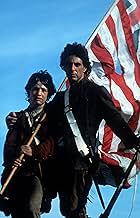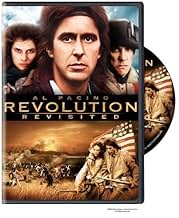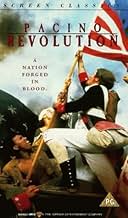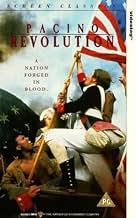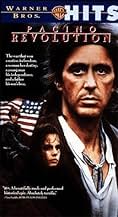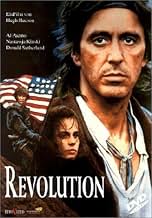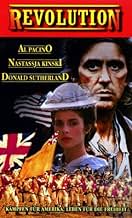NOTE IMDb
5,3/10
8 k
MA NOTE
Ajouter une intrigue dans votre langueA trapper and his young son get pulled into the American revolution early as unwilling participants and remain involved through to the end.A trapper and his young son get pulled into the American revolution early as unwilling participants and remain involved through to the end.A trapper and his young son get pulled into the American revolution early as unwilling participants and remain involved through to the end.
- Réalisation
- Scénario
- Casting principal
- Récompenses
- 1 victoire et 4 nominations au total
Cheryl Anne Miller
- Cuffy
- (as Cheryl Miller)
Avis à la une
I've watched this film several times over the years and was really surprised to learn (after checking it out on IMDB) that is was considered a flop at the time of its release! Also baffled completely by the relatively low rating.
I'm certainly not an expert on this historical timeframe and like most period films, I'm sure they got some things wrong. However, this gritty, grimy film seemed to me, what the time and place must have been like. In other words, it conveys a certain, almost documentary style realism, right down to the rather odd pacing of the film's plot. The film doesn't seem to build to a climatic ending, but rather plays out a slice of life in all its awkwardness. Compared to a film like, "The Patriot" (which contains some pretty outrageous Hollywood stuff), I find this somber film to better represent the period (in my mind).
Oh, I liked Pacino's performance! It isn't over the top. He seems like a regular fellow caught up in extraordinary events. Again, can't understand the overly critical review of his acting here. Ditto for Sutherland and Kinski.
Definitely worth watching if you're looking for something outside of a formula Hollywood "history" movie. I think it will become more highly regarded in its context as time goes on.
I'm certainly not an expert on this historical timeframe and like most period films, I'm sure they got some things wrong. However, this gritty, grimy film seemed to me, what the time and place must have been like. In other words, it conveys a certain, almost documentary style realism, right down to the rather odd pacing of the film's plot. The film doesn't seem to build to a climatic ending, but rather plays out a slice of life in all its awkwardness. Compared to a film like, "The Patriot" (which contains some pretty outrageous Hollywood stuff), I find this somber film to better represent the period (in my mind).
Oh, I liked Pacino's performance! It isn't over the top. He seems like a regular fellow caught up in extraordinary events. Again, can't understand the overly critical review of his acting here. Ditto for Sutherland and Kinski.
Definitely worth watching if you're looking for something outside of a formula Hollywood "history" movie. I think it will become more highly regarded in its context as time goes on.
Sort of both a proto-PATRIOT (though mildly less-addlebrained) with reverse-elements of LAST OF THE MOHICANS (the Huron are the good guys this time around), this film covers the criminally underrepresented ground of the American Revolutionary War in a generally hackneyed way. I did like the recurrence of some elements in the film, such as how it was really "about" bonding with and protecting sons and how the careers of protagonist Pacino contrasted with oddly-cast British antagonist Sutherland. The two characters feel cartoonish at times as Sutherland carries out several heartless atrocities, exemplifying the un-nuanced way British are often depicted as villains, but he also impressively comes off like an honorable human being at the same time.
There's about as many baffling decisions on display as there are surprisingly good ones. What barely qualifies as a "love story" between Pacino and Kinski never makes sense and it's never clear why bougie but idealistic Kinski gets so enthralled with apathetic commoner Pacino. All of Kinski's scenes slow the film down along with many irritating scenes of Pacino getting wronged and stolen from left-and-right with him usually responding by angrily shouting at someone. The actual battle scenes come off very stiff and awkward, though to be fair that was generally the fighting style of the time.
I do give the film credit for actually recasting one of the characters as he ages instead of relying on goofy makeup or prosthetics. I also give it credit for the ending holding back on the most obvious way of concluding the narrative and reminding us that the characters in the film actually are supposed to be human beings. It is a bit baffling though that since the film was made in Europe with so much British money that they went with Donald Sutherland as the villain with a distracting accent. They could easily have cast any number of local British character actors of the day (say someone ike Anthony Hopkins, Paul Darrow, John Hurt, etc and the film would have been 50% better.
A good looking film with a couple nice surprises and believable production design, but unfortunately weighed down with too many flaws and pacing issues.
There's about as many baffling decisions on display as there are surprisingly good ones. What barely qualifies as a "love story" between Pacino and Kinski never makes sense and it's never clear why bougie but idealistic Kinski gets so enthralled with apathetic commoner Pacino. All of Kinski's scenes slow the film down along with many irritating scenes of Pacino getting wronged and stolen from left-and-right with him usually responding by angrily shouting at someone. The actual battle scenes come off very stiff and awkward, though to be fair that was generally the fighting style of the time.
I do give the film credit for actually recasting one of the characters as he ages instead of relying on goofy makeup or prosthetics. I also give it credit for the ending holding back on the most obvious way of concluding the narrative and reminding us that the characters in the film actually are supposed to be human beings. It is a bit baffling though that since the film was made in Europe with so much British money that they went with Donald Sutherland as the villain with a distracting accent. They could easily have cast any number of local British character actors of the day (say someone ike Anthony Hopkins, Paul Darrow, John Hurt, etc and the film would have been 50% better.
A good looking film with a couple nice surprises and believable production design, but unfortunately weighed down with too many flaws and pacing issues.
After the Academy Awards, the most important awards ceremony is the Golden Raspberries (known as "Razzies") – the "worst of" counterpart to the Oscars. The thing about the Razzies is that they don't go for the literal worst movies of the year – otherwise they would give prizes to a load of trashy B-movies. Instead they bestow their honours upon the high profile flops, the movies that could have been so much more, the casts and crews who should have known better. Revolution stars Al Pacino, one of the greatest actors of his generation, and was directed by Hugh Hudson, he of 1981 Best Picture Chariots of Fire. And yet, in a stark "Oh how the mighty have fallen" scenario, it recouped less than two percent of its budget at the box office and was nominated for four Golden Raspberries.
Revolution is not without promise. In contrast to the usual gung-ho attitude of pictures on this subject (cf. The Patriot), this takes an approach rare in historical pictures on any era, showing not the makers and shapers of change, but those unwillingly caught up in it. The Robert Dillon screenplay still ultimately comes down on the side of the revolutionaries, but it shows the conflict with the minimum of political emotiveness, and a storyline whose occasional poignancy comes from its even-handed intimacy. Director Hudson has excelled in creating tableaux that are full of believable bustle and period dirt, even if they were entirely shot in rainy England. There's a realistic melange of accents to be heard here; not just clipped British and broad American, which didn't really exist in any recognisable form at the time anyway. The credibility of some of the bit parts is very effective, such as the bolshy soldier who prods Pacino when he's chosen for the fox hunt, a slappable face if ever there was one.
And yet the movie's the biggest flaws are on the same grounds. There are some woefully unrealistic and downright silly characterisations here. Chief among these is Nastassja Kinski's. While no means badly acted (in fact she does very well all things considered), the character as written is in no way believable. Not that you can't have rebellious and resourceful women, but stabbing a man in the nadgers at a soirée is a bit hard to swallow. It would probably have warranted her a stint in an asylum, and certainly more than just a telling off from her mother. And giving the Englishman in question a stupid nasal voice and cartoonish demeanour was a huge mistake. It all seems totally at odds with the realism elsewhere in the movie. There are problems too with the over-earnest attempt at a documentary look. Hudson's constant use of hand-held camera quickly becomes tiresome. Pacino's performance is heartfelt but there are times when he appears to break into improvisation yet comes across too much as the modern New Yorker.
In response to its poor reception, Hudson would later revisit the material for a 2009 special edition appropriately titled Revolution Revisited, and it is this version of the movie which I have seen. Apparently around ten minutes of footage was shorn off (I don't know what this was so can't comment), and they added narration by Pacino, written and recorded ad hoc. This latter was to my mind a mistake – it adds nothing, basically spelling out the character's thoughts at any given moment, even though the essence of them is already there on the screen. It somewhat spoils the taciturn moodiness of the character, as well as the chaotic wordlessness of some scenes. It's nice however to be able to enjoy a decent new transfer of the picture, because it really isn't as bad as its reputation (and those Razzie nominations, all of which it lost to Rambo II, I hasten to add) would suggest. It is incredibly moving at times, a high point being Pacino's desperate comforting of Ned as his foot wound is cauterized. It's also beautifully shot. This is ultimately a movie of two sides – the very good and the very bad, with no middle ground of mediocrity. And this is very frustrating, because you can see just how easily it could have been a masterpiece.
Revolution is not without promise. In contrast to the usual gung-ho attitude of pictures on this subject (cf. The Patriot), this takes an approach rare in historical pictures on any era, showing not the makers and shapers of change, but those unwillingly caught up in it. The Robert Dillon screenplay still ultimately comes down on the side of the revolutionaries, but it shows the conflict with the minimum of political emotiveness, and a storyline whose occasional poignancy comes from its even-handed intimacy. Director Hudson has excelled in creating tableaux that are full of believable bustle and period dirt, even if they were entirely shot in rainy England. There's a realistic melange of accents to be heard here; not just clipped British and broad American, which didn't really exist in any recognisable form at the time anyway. The credibility of some of the bit parts is very effective, such as the bolshy soldier who prods Pacino when he's chosen for the fox hunt, a slappable face if ever there was one.
And yet the movie's the biggest flaws are on the same grounds. There are some woefully unrealistic and downright silly characterisations here. Chief among these is Nastassja Kinski's. While no means badly acted (in fact she does very well all things considered), the character as written is in no way believable. Not that you can't have rebellious and resourceful women, but stabbing a man in the nadgers at a soirée is a bit hard to swallow. It would probably have warranted her a stint in an asylum, and certainly more than just a telling off from her mother. And giving the Englishman in question a stupid nasal voice and cartoonish demeanour was a huge mistake. It all seems totally at odds with the realism elsewhere in the movie. There are problems too with the over-earnest attempt at a documentary look. Hudson's constant use of hand-held camera quickly becomes tiresome. Pacino's performance is heartfelt but there are times when he appears to break into improvisation yet comes across too much as the modern New Yorker.
In response to its poor reception, Hudson would later revisit the material for a 2009 special edition appropriately titled Revolution Revisited, and it is this version of the movie which I have seen. Apparently around ten minutes of footage was shorn off (I don't know what this was so can't comment), and they added narration by Pacino, written and recorded ad hoc. This latter was to my mind a mistake – it adds nothing, basically spelling out the character's thoughts at any given moment, even though the essence of them is already there on the screen. It somewhat spoils the taciturn moodiness of the character, as well as the chaotic wordlessness of some scenes. It's nice however to be able to enjoy a decent new transfer of the picture, because it really isn't as bad as its reputation (and those Razzie nominations, all of which it lost to Rambo II, I hasten to add) would suggest. It is incredibly moving at times, a high point being Pacino's desperate comforting of Ned as his foot wound is cauterized. It's also beautifully shot. This is ultimately a movie of two sides – the very good and the very bad, with no middle ground of mediocrity. And this is very frustrating, because you can see just how easily it could have been a masterpiece.
"Revolution" could have been a fascinating story. Unfortunately, it seems that director Hugh Hudson had shot his entire wad when he made the Oscar-winning "Chariots of Fire". Both "Greystoke" and this film were sloppy, choppy messes with no narrative flow. It is confounding, because it is obvious that there was a lot of attention to detail in parts of "Revolution". But only in parts. There is as much here that simply doesn't fit--the most glaring example being Al Pacino performance as a colonial trapper. He apparently forgot what movie he was in, and frequently uses a halting accent very similar to the one he used only two years earlier in Brian DePalma's "Scarface". And I don't think his character was supposed to be Cuban. The rest of the film produces the same effect you would get from flipping through a beautiful set of American Revolution postcards--at random.
This movie has consistantly been trashed by numerous professional and amateur reviewers alike. Even Leonard Maltin, my personal favorite movie guy, rated it a "BOMB". I can`t understand why. Although it isn`t a perfect film endeavor, it does tell a story that`s never been told before...but obviously in a manner that many found extremely annoying at best. Aside from New York and L.A. movie houses, I don`t believe this film was released nationally at any time. Personally, I thought it was a very different type of movie, but effective and entertaining in a strange way. It gave me a feel for the time period, including an appealing atmospheric identity. Being an ex-NewYorker and exposed to the famous Revolutionary battlefields, that still exist throughout the metro area, I felt an aura of actually being present in that time period, with events occuring on both surrealistic and realistic levels. Al Pacino is a born/raised New Yorker and I believe captured the essence of his character very well. Pacino gave a solid portrayal of an 18th. century individual caught up in a violent period of American history. This movie has been unfairly criticized and overly maligned in my humble opinion. A unique film deserving of more praise then it has been awarded. See it for yourself.
--------------------------------------------------------------------------- -----
--------------------------------------------------------------------------- -----
Le saviez-vous
- AnecdotesWhen Annie Lennox's character sings a song near the end of the movie, her voice is dubbed.
- GaffesIn battle, the British soldiers are depicted taking short steps; in reality, Redcoats were trained to take long paces, so as to close the range quickly.
- Versions alternativesIn 2009, Hugh Hudson made his own director's cut titled "Revolution Revisited" which was also released on DVD. The new version featured new narration recorded by Al Pacino, a different ending, and removed 10 minutes of footage from the film.
- ConnexionsEdited into Give Me Your Answer True (1987)
Meilleurs choix
Connectez-vous pour évaluer et suivre la liste de favoris afin de recevoir des recommandations personnalisées
- How long is Revolution?Alimenté par Alexa
Détails
- Date de sortie
- Pays d’origine
- Langue
- Aussi connu sous le nom de
- Revolution
- Lieux de tournage
- King's Lynn, Norfolk, Angleterre, Royaume-Uni(New York scenes)
- Sociétés de production
- Voir plus de crédits d'entreprise sur IMDbPro
Box-office
- Budget
- 28 000 000 $US (estimé)
- Montant brut aux États-Unis et au Canada
- 358 574 $US
- Week-end de sortie aux États-Unis et au Canada
- 52 755 $US
- 29 déc. 1985
- Montant brut mondial
- 358 574 $US
- Durée
- 2h 6min(126 min)
- Couleur
- Rapport de forme
- 2.35 : 1
Contribuer à cette page
Suggérer une modification ou ajouter du contenu manquant


